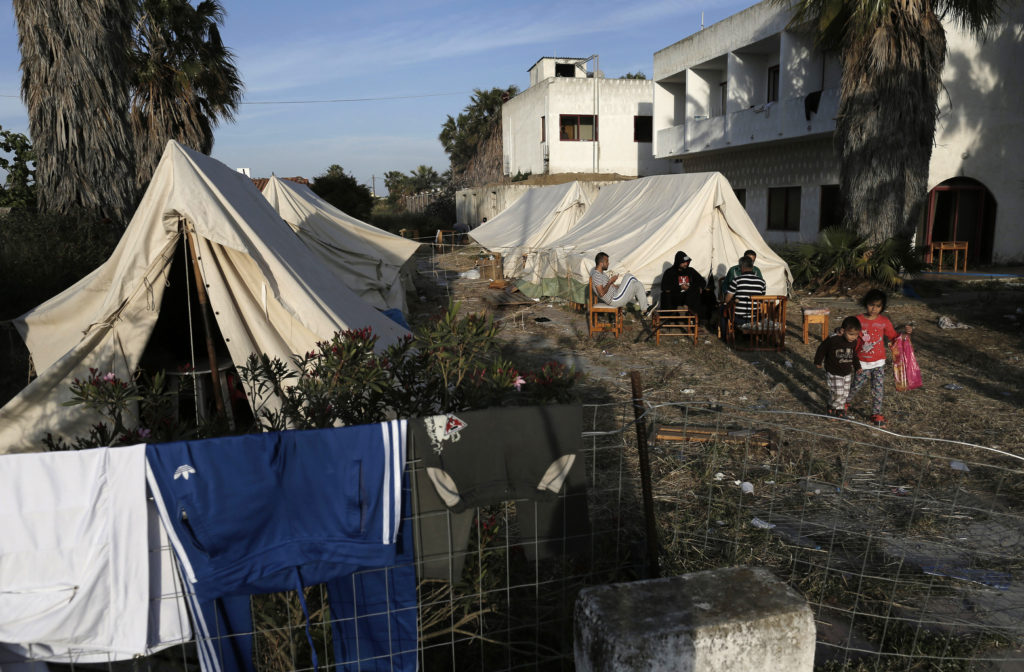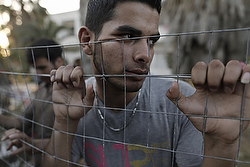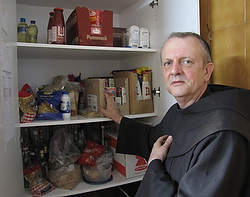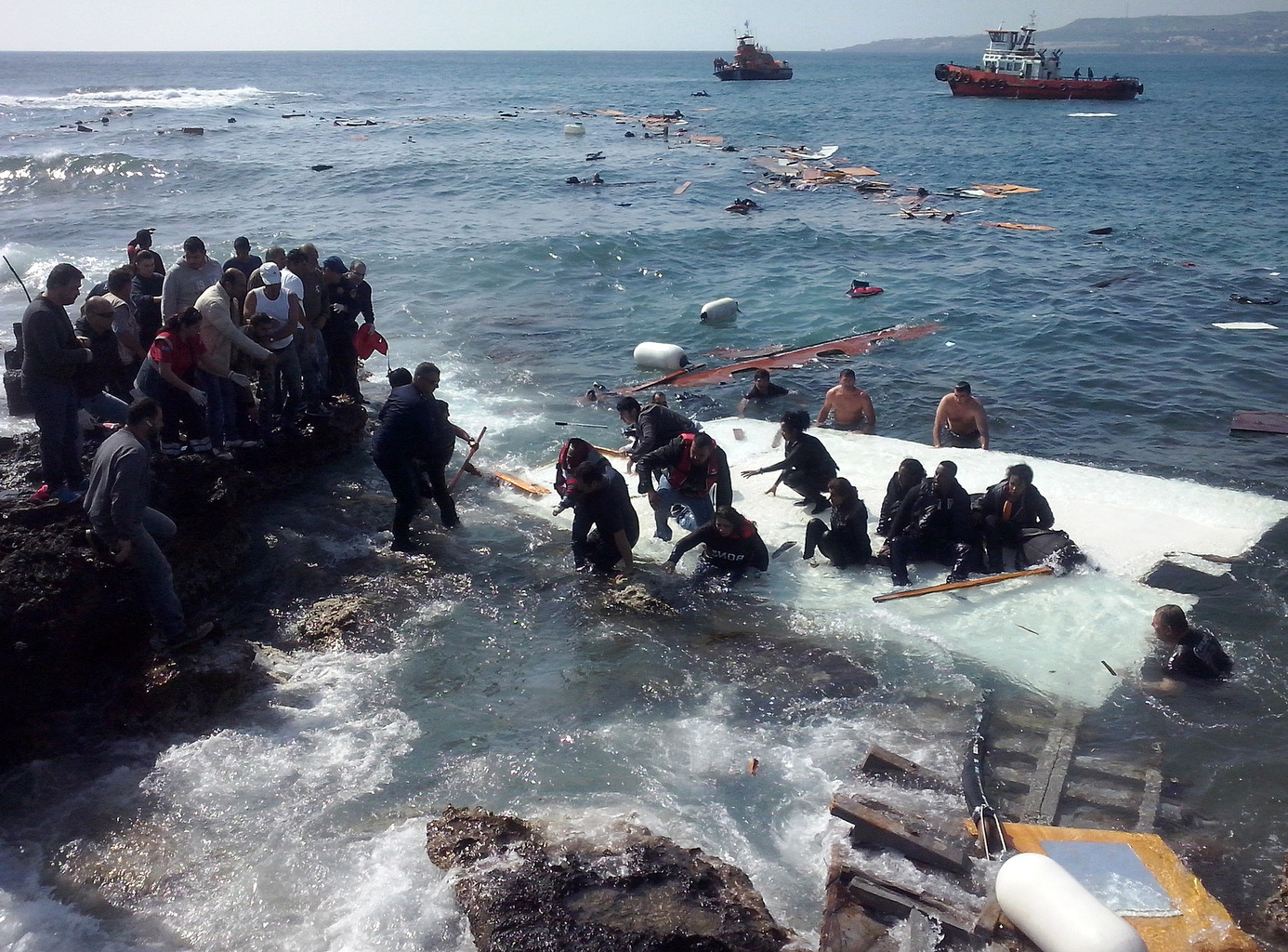
RHODES, Greece (CNS) — When a wooden sailboat carrying some 100 refugees capsized in the crystal clear waters of this tiny paradise-like Greek island, local fisherman and the Greek coast guard immediately went to their rescue.
While only three drowned in the April incident, 30 had to be taken to the hospital, where Franciscan Father John Luke Gregory, Santa Maria Parish priest and a native of Sheffield, England, is often called on for help because of his knowledge of Arabic.
“The boat capsized and they panicked, the water is not as deep or as rough as (in other places) but if you can’t get to the coast and don’t know how to swim it can be dangerous,” said Fr. Gregory. “The traffickers do a very lucrative business. The numbers of refugees who are arriving here has grown enormously since I came here in 2004.”
Most of the refugees and migrants attempting to reach Rhodes and the neighboring smaller island of Kos are escaping war and economic hardship, mainly from Pakistan and Syria — especially since the civil war began in 2011 — but they also come from African countries, he said.
“We don’t know how many of them die at sea,” said Fr. Gregory. “The bodies wash up on Kos beaches, which is closer to Turkey.”
All along the European coastline, from Spain down to economically floundering Greece, migrants from the Middle East, Asia and Africa are risking their lives in an attempt to reach safety.
They make the dangerous journey packed by smugglers into often perilously unseaworthy vessels, from nearby Turkey, said Fr. Gregory. Before coming to Greece, he had spent seven years working in the secretariat of the Custody of the Holy Land in Jerusalem. His knowledge of various languages has proved instrumental for him to be able to communicate not only with his multicultural parishioners, but with the growing influx of refugees as well.

Most of the refugees who reach Rhodes are young men, he said. The majority seem to leave their home countries because they have suffered fear and persecution and have often been abused based on their race, social group, religion or, in the cases of the more educated ones and especially university students, because of their political views.
Many of the Africans leave their countries to escape civil war and have been “boy soldiers” in different militias, added Fr. Gregory. Though reluctant to speak about their experiences even to a priest, the refugees, both Muslim and Christian, have told Fr. Gregory about abuses they have suffered at the hands of the traffickers and some of the hardships they faced on their long journey.
“They … do not wish to re-live their dangerous passage across land and sea; other times they are worried that perhaps their story, once told, could jeopardize their chances of being helped,” he said. They are also hesitant to speak about their stories to the press for the same reason and out fear for their families back home.
“They risk their lives because they are desperate to find safety and often use any means of escape possible, earning and saving for months or borrowing large amounts of money to effect their escape,” Fr. Gregory said. “Many have told me that they leave their homes and their country because they have no other choice. They leave because their government will not or cannot protect them from serious human rights abuses or meet their needs and those of their families.”
[quote_box_center]
RELATED:
Europe struggles to find solution to increasing migrant crisis
[/quote_box_center]
In Kos, he said, many migrants are from Pakistan; they seem to be more economic migrants coming in order to help their families who live in extreme conditions of poverty, he said.
Fr. Gregory told of a recent Mass he celebrated while in Kos where the Gospel reading was St. John 13:34, in which Jesus tells his followers to love one another as he has loved them. Fr. Gregory said he connected the passage to the need for caring for the refugees.
“The Gospel could not have been more apt,” he said. After the Mass, a young man from Pakistan came up to him and spoke to him with great emotion, added Fr. Gregory.
As a Catholic in a largely Muslim country, the young man, named Imran, had been persecuted by the Taliban. Both of his parents were dead.
Fr. Gregory asked him if he needed anything and Imran answered, “just your prayers and your kind words.”
“Imagine the simplicity of trust in the church and what a few kind words can do,” said Fr. Gregory. “His face manifested his happiness of these few kind words. The charity of Christ really does leave us no choice.”
Authorities in Rhodes, though already cash strapped as Greece faces its own economic crisis, have not turned their backs on any refugees, said Fr. Gregory, who is often called on for collaboration or translation help with the refugees.

Together with his parishioners, Fr. Gregory stocks up a food pantry for all of the needy, who can come at any time of the day and knock on the door to receive a small food basket. On Tuesdays parishioners also give out loaves of traditional “St. Anthony’s Bread,” which has been blessed. Any needy person can use the washing machine Fr. Gregory specifically placed in the parish hall free of charge and are welcome as members of the parish.
“Our own Catholic community is committed to assisting the refugees regardless of politics, race, religion or social group,” he said. “The church is committed to help and support these vulnerable and suffering people. As a Christian faith community we are motivated by the love of Christ that leaves us no choice, and thus we are committed to helping these vulnerable, fearful and needy people.”
— By Judith Sudilovsky, Catholic News Service.







